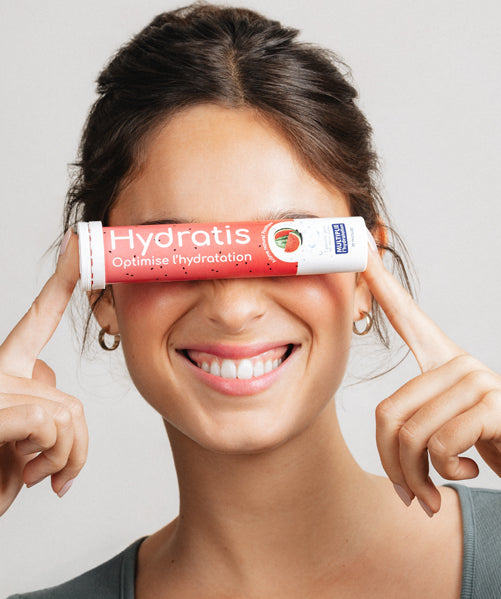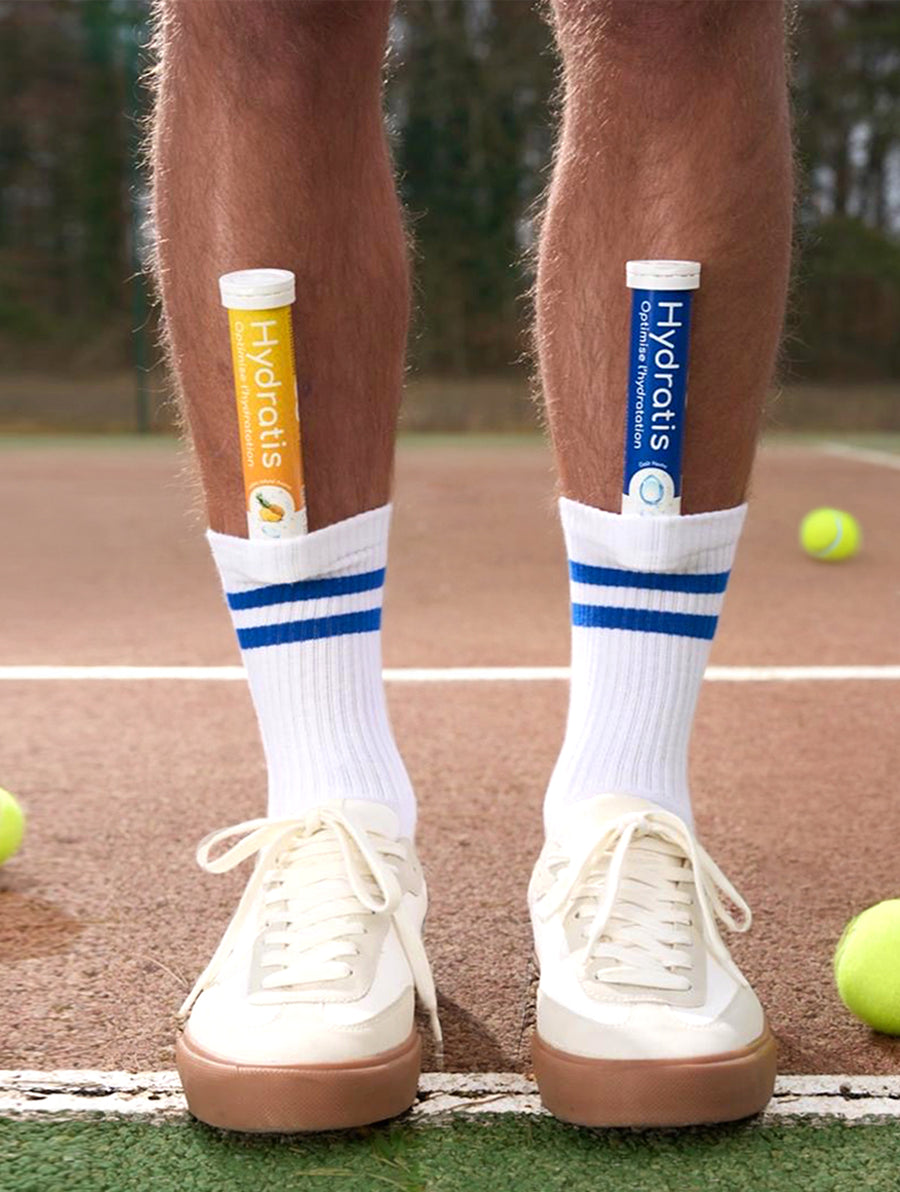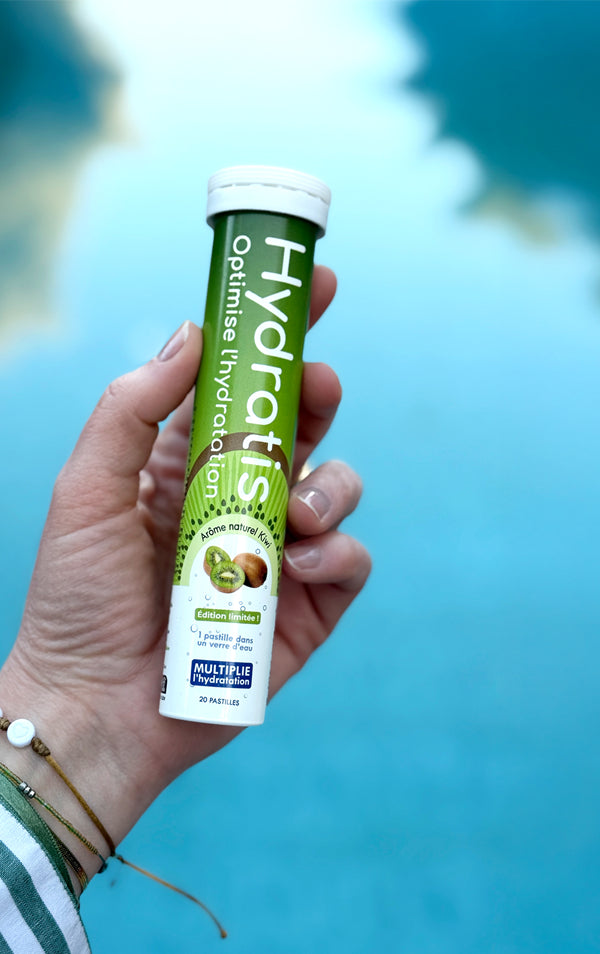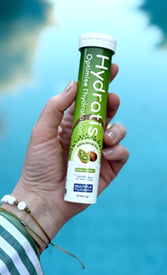What is dehydration in children?
Dehydration in children is characterized by excessive loss of water and electrolytes . Infants and young children are particularly vulnerable due to their reduced fluid reserves and rapid metabolism. Causes include gastroenteritis , fever , vomiting, diarrhea , and inadequate hydration .
How to recognize dehydration? (Signs and symptoms)
Mild dehydration
The signs are most often:
- Increased thirst
- Lips, mouth slightly dry
- Infrequent, dark urine
- Fatigue, mild irritability
When should you worry?
If these symptoms persist or worsen, it is important to consult a healthcare professional. Monitoring is essential to prevent severe dehydration .
Moderate to severe dehydration
The signs are as follows:
- Very dry mouth and mucous membranes
- Absence of tears when crying
- Sunken eyes, depressed fontanelle in infants
- Very infrequent urination or absence of urination for several hours
- Drowsiness, lethargy, confusion
- persistent skin fold
- Rapid weight loss
When should I go to the emergency room?
The presence of these signs indicates moderate to severe dehydration requiring urgent medical attention. Intravenous rehydration may be necessary to restore the child's fluid balance .
Correlation between dehydration and gastroenteritis
Gastroenteritis is a major cause of dehydration in children . It leads to a significant loss of fluids and electrolytes through vomiting and diarrhea.
Why does gastroenteritis cause dehydration?
Gastrointestinal infections (such as gastroenteritis) impair the intestine's ability to absorb water and electrolytes, leading to significant fluid loss . In children, this loss can rapidly lead to severe dehydration .
What are the symptoms?
- Frequent diarrhea, liquid
- Repeated vomiting
- Refusal to drink, to eat
- Fever
- Signs of dehydration mentioned
How to rehydrate a child?

Oral rehydration solution
What is its purpose?
Oral rehydration solution (ORS) is the standard treatment for mild to moderate dehydration in children. It effectively compensates for water and electrolyte losses and prevents a potential worsening of the child's overall condition.
Composition and operation
Oral rehydration solution (ORS) contains a balanced mix of essential minerals such as sodium, potassium, chloride, and glucose. This sodium-glucose combination promotes rapid water absorption by the intestine through an active transport mechanism, even when the intestinal lining is irritated by diarrhea or vomiting.
Available in pharmacies, it is generally presented in sachets to be diluted in 200 ml to 250 ml of water, as recommended. Its composition is strictly defined by the WHO and health authorities to guarantee optimal effectiveness and maximum tolerability.
How to use this ORS effectively?
By age group:
- Breastfed baby : continue breastfeeding. Give the ORS by spoonful between feedings.
- Bottle-fed baby: temporarily replace the usual milk with ORS for 4 to 6 hours.
- For children : offer ORS by cup or spoon. Maintain a light and appropriate diet.
What to do in case of vomiting?
Wait 10 to 15 minutes, then administer the ORS in small amounts (5 to 10 ml every 5 minutes). If vomiting persists, please consult a healthcare professional.
Can other medications be given in parallel?
Case of Tiorfan and other antidiarrheal treatments
Tiorfan (racecadotril) may be prescribed, in addition to oral rehydration solution, to reduce the duration and severity of acute diarrhea in children . This medication works by limiting the secretion of water and electrolytes in the intestine, thus reducing stool volume.
However, Tiorfan is not a substitute for oral rehydration solution (ORS), which remains the cornerstone of treatment. Its use must always be under medical prescription and supervision, particularly depending on the child's age and the progression of symptoms.
It is strongly advised against giving a child antidiarrheal, antiemetic, or antispasmodic medication without medical advice. Some active ingredients may be ineffective or even dangerous in young children, especially in cases of infectious diarrhea.
In case of doubt, only a healthcare professional can determine if additional treatment is justified, and under what conditions.
Preventing dehydration in children

The right rehydration techniques in case of diarrhea or fever
When a child has a fever, diarrhea, or vomiting, it is essential to act at the first signs to prevent dehydration. Even if the child doesn't express thirst, they should be offered appropriate fluids regularly, as the sensation of thirst may appear late. Oral rehydration solution (ORS) should be introduced early, as soon as fluid loss is identified. At the same time, it is important to carefully monitor the frequency and color of urination, as well as the child's overall condition (level of alertness, gaze, muscle tone, and responsiveness).
It is also recommended to avoid unsuitable drinks such as sodas and very sugary fruit juices, which can further disrupt the body's balance . Preventive hydration, on the other hand, relies on the rapid and regular administration of water or an oral rehydration solution (ORS) (if dehydration persists) as soon as symptoms appear, without waiting for dehydration to become established.
Diet also needs to be adapted. During this period, it's best to favor easily digestible foods that are gentle on the digestive tract. Foods like carrot puree, well-cooked rice, ripe bananas, and compotes are particularly recommended. Conversely, it's advisable to avoid fatty foods, sweets, and high-fiber foods such as raw vegetables or whole grains , which can worsen digestive problems.
Rehydration protocol
Quantities according to weight and gravity
|
Child's weight |
Recommended ORS Volume |
|
< 10 kg |
50 to 100 ml after each loose bowel movement |
|
≥ 10 kg |
100 to 200 ml after each loose bowel movement |
In case of vomiting, the hydration strategy involves administering ORS in very small, spaced-out doses, generally between 5 and 10 ml every five minutes. This fractionated method improves digestive tolerance and allows for gradual absorption by the body . If the child does not drink the solution or if their condition worsens, consult a healthcare professional promptly.
For parents
If the child consistently refuses to drink, vomits after every attempt at hydration, or shows signs of moderate to severe dehydration (lethargy, sunken eyes, absence of urine, sunken fontanelle), it is imperative to consult a doctor immediately . Hospitalization with intravenous fluids may then be necessary.
To help parents with this monitoring, it can be useful to keep a tracking chart. This chart can include the child's weight, the number of bowel movements or episodes of vomiting, the volume of ORS administered, and the evolution of clinical signs. This facilitates communication with the doctor and allows for an assessment of the effectiveness of the hydration protocol.
Common questions
How do you hydrate a child who is vomiting?
Wait 10-15 minutes after vomiting, then offer ORS in very small amounts (5 ml every 5 minutes). Adjust according to the child's tolerance.
What is the rehydration protocol?
Use ORS according to the child's weight after each fluid loss. If in doubt, follow medical instructions.
How to rehydrate quickly?
Oral rehydration solution (ORS) is the fastest and most effective method for rehydration. Early, appropriate administration avoids the need for invasive treatments (intravenous infusion).
When should I give the Tiorfan medication to a child?
Only on medical advice. Tiorfan is a supplement to oral rehydration solution (ORS) and never replaces oral hydration.
Bibliography
French Society of Pediatrics (SFP): Official recommendations on the management of acute diarrhea and dehydration in children. https://www.sfpediatrie.com/sites/www.sfpediatrie.com/files/medias/documents/fiche-recommandations-diarrheesv3.pdf
Health Insurance – Ameli.fr: Clear information on what to do in case of gastroenteritis and dehydration in children. https://www.ameli.fr/herault/assure/sante/themes/gastro-enterite-enfant/que-faire-quand-consulter ?
MSD Manual – Healthcare Professional (France): Rehydration in children: principles, indications, protocols (ORS, IV). https://www.msdmanuals.com/professional/pediatrics/dehydration-and-fluid-therapy-in-children/oral-rehydration-therapy ?
Ameli - Preventing gastroenteritis in children and its spread https://www.ameli.fr/herault/assure/sante/themes/gastro-enterite-enfant/prevention ?
World Health Organization (WHO): Universal Protocol for the Treatment of Diarrhea and Dehydration in Children (ORS, Zinc, Follow-up). https://www.who.int/publications/i/item/9241593180
World Health Organization (WHO) = Diarrhea and dehydration https://www.ncbi.nlm.nih.gov/books/NBK143745/






